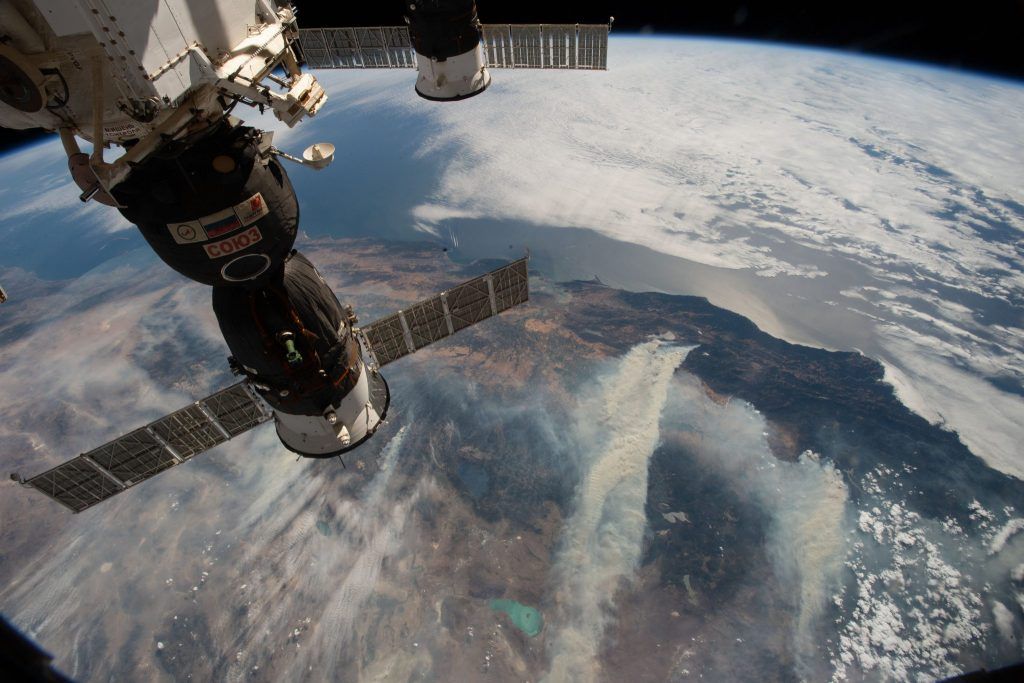Poll: The public and Washington don’t share the same space priorities
By Dan Drollette Jr | August 10, 2018
 Wildfires in northern California on August 9, as seen from the International Space Station 253 miles above the Earth. Image courtesy of NASA
Wildfires in northern California on August 9, as seen from the International Space Station 253 miles above the Earth. Image courtesy of NASA
Quick – what percentage of Americans think that NASA should focus most of its energy on sending humans back to the moon?
The answer: 3 percent.
According to a new poll released last week by Bloomberg Businessweek and the Washington, DC-based research firm Morning Consult, most Americans feel that while it’s all very well for NASA to work on going back to the moon, building a orbiting lunar platform, conducting deep-space exploration, or planning a mission to Mars, its first priority should be on using its satellites and other space-based technology to look in greater detail at spaceship Earth.
This is in stark contrast to the Trump administration – as a candidate, Trump had pushed for manned Mars missions. (And on a related note, yesterday, Vice President Mike Pence said that President Donald Trump will call on Congress to allocate $8 billion over the next five years to establish a US Space Force as a new branch of the military. Minutes after Pence finished speaking, Trump tweeted: “Space Force all the way!”)
Meanwhile, the American public takes a different, less grandiose view, more focused on immediate, close-to-home concerns such as climate change, according to the wide-ranging poll of Americans’ views on space.
Observing the climate should be NASA’s “top priority,” according to 43 percent of those surveyed, who chose from six possible options. About 25 percent of respondents said that the agency should monitor asteroids, while only 8 percent said a human trip to Mars or other planets should be the main goal of the agency. Only 3 percent said NASA’s top focus should be sending astronauts to the moon.
Most Americans said NASA’s top priority should be to monitor the world’s climate. This is reflected, to some extent, by NASA’s own Earth Science initiatives—all of which are targeted to be axed by the president. These initiatives include the Orbiting Carbon Observatory (an instrument designed to monitor atmospheric CO2); the Plankton, Aerosol, Cloud, and ocean Ecosystem mission to monitor the planet’s ocean health; the Climate Absolute Radiance and Refractivity Observatory (which makes climate predictions based upon its reflected solar spectrometer; and the Deep Space Climate Observatory– a space weather and Earth observation satellite that monitors solar wind conditions.
To make sense of the findings, an article in Bloomberg about the poll quoted Casey Dreier, director of space policy at the Planetary Society, an organization which lobbies for greater funding of space exploration and space science. Dreier noted that most people view space issues through a prism of relevance to one’s daily life, and commented: “What’s relevant to people? Climate change…”
One place of agreement: According to pollsters, while the public and the administration may disagree about the organization’s priorities, NASA is one of the few government agencies to enjoy widespread bipartisan support. “People love NASA” said Carl Cannon of Real Clear Politics, during a June 27 appearance on The Hill.
Publication Name: Bloomberg
To read what we're reading, click here
Together, we make the world safer.
The Bulletin elevates expert voices above the noise. But as an independent nonprofit organization, our operations depend on the support of readers like you. Help us continue to deliver quality journalism that holds leaders accountable. Your support of our work at any level is important. In return, we promise our coverage will be understandable, influential, vigilant, solution-oriented, and fair-minded. Together we can make a difference.
Keywords: NASA, Space Force, space
Topics: What We’re Reading














